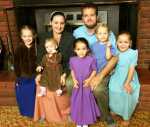A Mennonite family in the Ukraine: Abner and Marlene Stoltzfus

December 2, 2014 marked the five-year anniversary of Abner and Marlene Stoltzfus' journey as part of a Mennonite mission in the Ukraine. The Stoltzfuses returned to the U.S. to visit family recently and agreed to share some of the details of their life in Ukraine.
They were living in Pennsylvania and the bishop of their church, who is on the board of directors for the Master's International Ministries mission in Ukraine, asked if they would fill a vacant position. They agreed and traveled to Kiev, where they lived for three and a half years.
The Stoltzfuses were then relocated to a village about two hours outside of Kiev. Life in the village is a stark contrast to life in the U.S. or even in Kiev.
"The lifestyle is very different," explains Marlene. "People live with a lot less and there are many people living in a small area."
"In the village they raise their food and not many people have outside jobs," says Abner. "A lot of people don't have running water. Their haymaking is done by hand and with horses and wagons. There is a huge contrast between village and city life."
The Stoltzfuses took classes to learn to speak Russian but are still working on their language skills.
"The biggest difference is the language. In Kiev they speak Russian but in the village it's a mixture of Russian and Ukrainian. The people are very different," says Marlene.
"When you meet someone they seem closed and cold at first but as time goes on and you get to know them they're a very warm and friendly culture. It takes time to bridge the gap between stranger and friend," Abner reveals.
The Mennonite mission was started in Ukraine approximately 20 years ago. Abner currently serves as pastor for the church, which ministers to about 35 members. Around 60 people attend the church regularly, however. Abner is capable of preaching in Russian but typically preaches through an interpreter.
"The mission began right after communism fell and there was a deep spiritual hunger in the country. Many people were seeking something. All their lives they knew there was a God but their government told them otherwise," says Marlene. "We want our life to reflect what Jesus is. We want people to think of Jesus when they see our life."
In addition to serving as pastor of the church, Abner assists the villagers with grass cutting and wood cutting.
"This is a way to reach out to villagers to get to know them and establish relationships," he says.
Most villagers get by through raising crops such as potatoes, cabbage, carrots and beets. However, if there are extra expenses, such as medical bills, or if a person is older and unable to work, getting by can be difficult. A group called Christian Aid Ministries offers programs to help with heating expenses in the wintertime. The Ministry also offers a seed program; every winter youth from the U.S. travel to Ukraine and package seeds. They then hold meetings at public places and villagers can hear the evangelistic messages and the singing and receive packages of seeds and literature.
"The seeds are high quality," Marlene explains. "In the Ukraine it's hard to buy high quality seeds for a low price. These seeds have a germination rate of almost 100 percent."
The Stoltzfus family also has five children: Aleah, Amanda, Marina, Liliana, and Katelyn, who range in age from seven years to seven months. The children are also learning to speak Russian. Two-year-old Liliana speaks English, Pennsylvania Dutch, and Russian.
"She was singing in Russian before she was singing in English," says Marlene.
The Stoltzfuses plan to remain in the Ukraine indefinitely.
"The main religion in Ukraine is Orthodox so there are a lot of rituals. The concept of God is more about ideas and observances rather than a relationship with Jesus Christ. Our goal is to be an example of God's word and a relationship with Christ," Abner says. "It's more than just some dead religion. It makes a difference in how we live."
